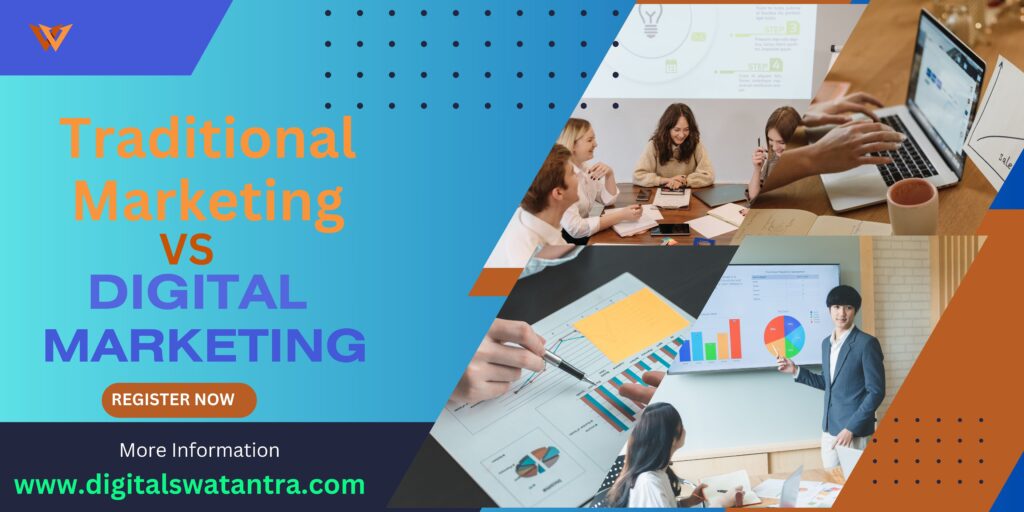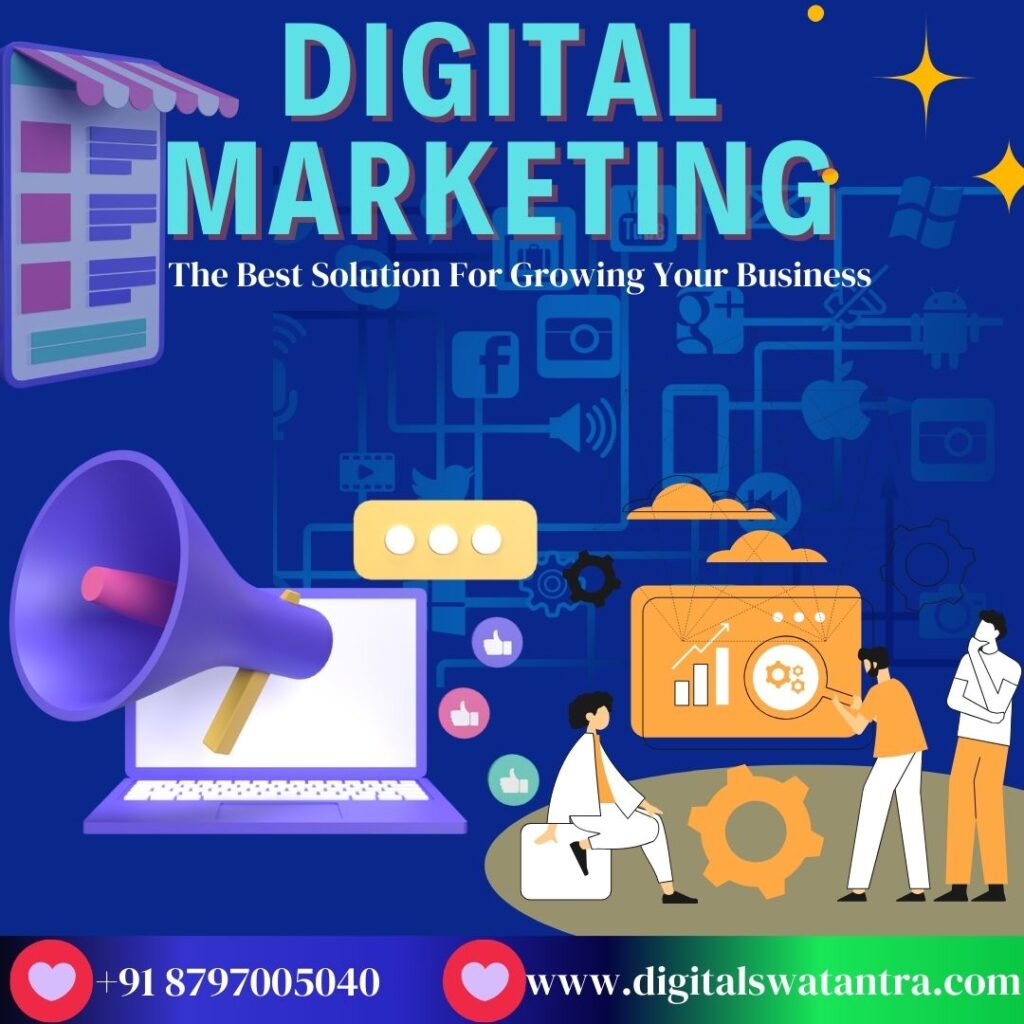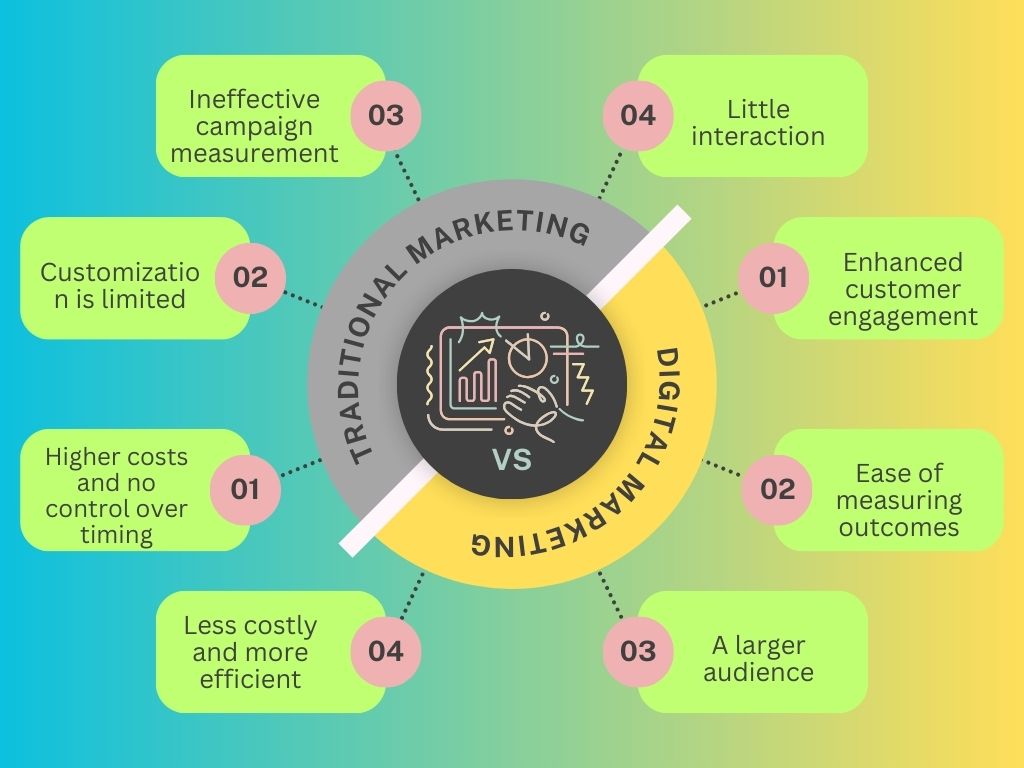Traditional marketing vs digital marketing encompasses formal methods of promotion used by businesses to reach the target audience before the internet era. It includes various channels such as print media (newspapers, magazines), broadcast media (television, radio), outdoor advertising (billboards, flyers), and direct mail (catalogues, brochures). These methods have been used since ancient times and are still relevant in many contexts today.
However it comes with high cost and Limited opportunities for Direct consumer interaction and different challenges in measuring precise return on investment. Despite these limitations traditional marketing remains a valuable tool in particular local business and older demographic fields where many peoples are not engaged with digital platforms. Differences are describing below between traditional marketing vs digital marketing.

Advantages of Traditional Marketing:
- Broad Reach: Traditional marketing can reach a wide audience, especially through television, radio and print media. These channels can capture the attention of millions of people at once, making them effective for mass marketing campaigns.
- Tangibility: Print media such as newspapers and magazines offer a physical presence that digital media cannot. This tangibility can create a sense of credibility and trustworthiness among consumers.
- Local Targeting: Traditional marketing is highly effective for local businesses. For instance, a local restaurant can use flyers and local newspaper ads to attract nearby customers.
- Memorability: Physical advertisements such as billboards and posters can have a lasting impression on consumers, as they are often encountered in everyday environments.
Disadvantages of Traditional Marketing:
- High Costs: Traditional marketing methods can be expensive. TV and radio ads, in particular, require significant investment, and print media often involve recurring costs.
- Limited Interaction: Traditional marketing is typically a one-way communication channel. Consumers receive the message but have limited opportunities to interact or provide feedback.
- Difficulty in Measuring ROI: Tracking the effectiveness of traditional marketing campaigns can be challenging. Metrics such as reach and engagement are not as easily quantifiable compared to digital marketing.
- Declining Engagement: With the rise of digital media, consumer engagement with traditional marketing channels has been declining. Younger generations, in particular, are more inclined towards digital content.
Digital Marketing

Digital marketing only is the use of the internet, Electronic devices, Mobile, Social media platforms and digital channels. Digital marketing is a bunch of marketing techniques used to reach a vast range of targeted customers more quickly and cost effectively using various digital channels. Digital marketing technologies and strategies are used to promote their products, services, valuable ideas and knowledge.
Digital marketing includes various channels and digital platforms such as social media, search engines, web com, email marketing, content marketing, and online advertising. Digital marketing has gained immense popularity due to its ability to reach targeted audiences, measure campaign effectiveness and cost effectiveness. In general digital marketing is an umbrella term which is also known as data driven marketing and operates over the digital platform for the purpose of introduction and promotion of various goods and services.
Advantages of Digital Marketing:
- High ROI and conversion rate: Traditional marketing vs digital marketing, traditional marketing has a low conversion rate (ROI), whether digital marketing has a high conversion rates on investment (ROI) compared to traditional marketing. Techniques are included such as search engine optimization (SEO), pay-per-click (PPC), advertising and email marketing have proven to be highly effective in driving traffic generating leads and converting prospects into the customer.
- Targeted Reach: Digital marketing allows businesses to target specific demographics, interests, geographic locations and related behaviour audiences. This precision targeting ensures that marketing efforts reach the most relevant audience.
- Cost-Effectiveness: Compared to traditional marketing vs digital marketing, digital marketing is often more affordable. Small businesses can run effective campaigns with limited budgets, using digital platforms like social media and email marketing.
- Measurable Results: The best part of digital marketing is that you can measure its effectiveness very easily. It provides detailed analytics and metrics, allowing businesses to track the performance of their campaigns in real time. This data-driven approach helps in optimizing strategies for better results.
- Enhanced Engagement: Digital marketing encourages two-way communication between businesses and consumers. Social media platforms allow space to engage with their audience through comments, messages and posts. This two-way communication builds stronger relationships between business and consumers.
- Real-Time interaction and feedback: Traditional marketing vs Digital marketing , Digital marketing allows real-time interaction with the customer. For examples, social media platforms allow businesses to engage with their audience instantly responding to comments, queries and feedback. This immediate interaction builds trust and resonance with the customers.
- Enhances Customer Insights: Traditional marketing vs digital marketing, Digital marketing provides valuable insights into the customer behaviour and preferences. By analyzing data from website visits, social media interactions and email campaigns, businesses can gain a deeper understanding of their audience. These insights help in creating more targeted and personalized marketing strategies, improving customer satisfaction driving conversions.
- Accessibility and Convenience: Traditional marketing vs Digital marketing, Digital marketing can be managed remotely, making it convenient for businesses to operate and reach their audience from anywhere in the world. Digital marketing is accessible to businesses of all sizes with the proliferation of digital marketing tools and platforms, even small businesses with limited resources can launch effective digital marketing campaigns.
- Flexibility and Adaptability: Digital marketing ads. & campaigns can be quickly changed and modified if changing market condition.based on performance data. Businesses can test different strategies, where digital marketing allows for real time adjustments. This flexibility ensures that marketing efforts remain relevant and effective, even in dynamic market environments.
Disadvantages of Digital Marketing:
- Intense Competition: The digital marketing space is highly competitive, with countless businesses challenging for the attention of online users. Standing out digital marketing requires digital creativity and strategic planning.
- Dependence on Technology: Digital marketing totally depends heavily on digital technology and internet access. Technical changes or issues in algorithms can impact the effectiveness of campaigns.
- Security and Privacy Concerns: Digital marketing involves collecting and handling user data, raising concerns about privacy and security. Businesses must ensure compliance with data protection regulations.
- Short Attention Span: Online users have shorter attention spans, making it challenging to capture and retain their interest. Content needs to be engaging and relevant to hold their attention.
Comparison of Traditional marketing and Digital Marketing
Reach and Audience: Traditional marketing vs digital marketing both have different methods, such as TV and radio can reach a broad audience but lack the precision targeting of digital marketing. Digital marketing allows businesses to tailor their messages to specific demographics and interests, contents enhancing relevance and engagement.
Cost and ROI: Traditional marketing vs digital marketing, traditional marketing can be costly, digital marketing offers cost-effective options for businesses of all sizes. The ability to measure ROI accurately in digital marketing provides a significant advantage, allowing for better allotment of resources.
Engagement and Interaction: Traditional marketing vs digital marketing, traditional marketing is only a one-way communication channel, whereas digital marketing offers interactive engagement. Social media, email, and content marketing enable businesses to build relationships with their audience and receive valuable feedback.
Measurability and Analytics: Traditional marketing vs digital marketing surpasses in providing detailed analytics and performance metrics. Businesses can track the website traffic, conversion rates, and user behaviour, enabling data-driven decision-making. Traditional marketing, on the other hand, struggles with measuring campaign effectiveness.
Adaptability and Flexibility: Digital marketing offers the flexibility of adjusting campaigns in real time based on performance data. Traditional marketing methods are less adaptable, with changes often requiring significant time and resources.
Credibility and Trust: Traditional marketing vs digital marketing methods, particularly print media, often carry a sense of credibility and trustworthiness. Digital marketing must overcome skepticism and build trust through consistent and authentic messaging.
Integration of Traditional Marketing vs Digital Marketing

Many businesses find success by evaluating traditional marketing vs digital marketing strategies. This hybrid approach leverages the strengths of both methods to create a comprehensive marketing plan.
Examples of Integration:
- Cross-Promotions: Traditional marketing can use the channels to promote their digital platforms in business. For instance, a TV ad can encourage viewers to visit the company’s website or follow their social media pages.
- Consistent Branding: Maintaining consistent branding across traditional and digital channels reinforces brand identity and builds consumer trust. Visual and messaging consistency ensures a cohesive brand experience.
- Event Marketing: Traditional marketing methods such as flyers and posters can be used to promote digital events like webinars and online workshops. Conversely, digital channels can be used to amplify the reach of physical events.
- Customer Engagement: Combining the tangibility of traditional marketing with the interaction of digital marketing can enhance customer engagement. For example, a print ad can include a QR code that directs users to an online landing page.
Future Trends
As technology continues to evolve, the landscape of marketing will also change. Some future trends to watch include: Traditional marketing vs digital marketing
- Artificial Intelligence: AI will play a significant role in personalise marketing efforts. Predictive analytics and machine learning algorithms will enable businesses to deliver highly targeted and relevant content to consumers.
- Augmented Reality (AR) and Virtual Reality (VR): AR and VR will enhance the consumer experience by providing immersive and interactive marketing opportunities. Brands can create virtual showrooms, interactive ads, and AR-enhanced print materials.
- Voice Search Optimization: With the rise of smart speakers and voice assistants, optimising content for voice search will become essential. Businesses will need to adapt their SEO strategies to accommodate natural language queries.
- Sustainability Marketing: As consumers become more environmentally conscious, sustainability will become a keyword focus in marketing strategies. Brands that prioritise eco-friendly practices and communicate their sustainability efforts will resonate with modern consumers.
Conclusion
In summary: Both traditional marketing vs digital marketing have their unique advantages and challenges. Traditional marketing offers broad reach, tangibility, and credibility, while digital marketing provides targeted reach, cost-effectiveness, and interactive engagement. Digital marketing provides a comprehensive solution for reaching and connecting with their customers. Its flexibility, global reach and ability to deliver high ROI and conversion rates. Traditional marketing vs digital marketing, Both have the most effective marketing strategies often integrate the both methods to create a comprehensive approach. As technology advances, businesses must stay agile and adapt to emerging trends to remain competitive in the ever-evolving marketing landscape in traditional marketing vs digital marketing.
By understanding the strengths and limitations of each approach about traditional marketing vs digital marketing, businesses can make informed decisions and develop marketing strategies that resonate with their target audience, drive engagement, and achieve their goals.
